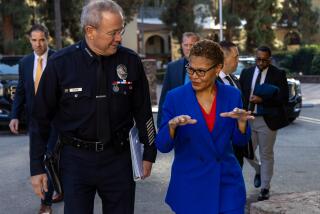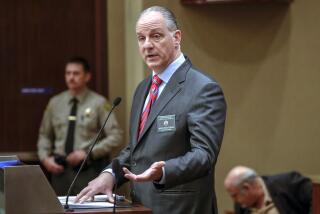Thornburgh Denies Shielding Aide : Justice Dept.: The attorney general says he didn’t try to hide the official’s failure of a lie detector test.
- Share via
WASHINGTON — Atty. Gen. Dick Thornburgh on Sunday denied that he had tried to hide the fact that his chief personal aide had flunked a lie detector test during a sensitive department investigation.
“Absolutely not,” Thornburgh said when asked about the allegation of Deputy Atty. Gen. Donald B. Ayer, the department’s No. 2 official, who has turned in his resignation, effective on Friday. The charge was reported by The Times on Sunday.
“Mr. Ayer is sadly misinformed about the facts,” Thornburgh said.
“There was no evidence that tied any person on my staff to the unauthorized disclosure.” Thornburgh was referring to a leak of information during an investigation of alleged financial irregularities in the office of House Majority Whip William H. Gray III of Pennsylvania.
Appearing on ABC’s “This Week With David Brinkley,” Thornburgh was asked about his former executive assistant, Robert S. (Robin) Ross Jr., who failed a lie detector test in the leak inquiry. Asked whether the failure was not “evidence,” Thornburgh responded: “No, it isn’t evidence of wrongdoing--not in our courts of law.”
Later, in a statement issued Sunday, Thornburgh said he found it “unfortunate that Mr. Ayer has chosen to conduct himself in this manner with respect to his former colleagues.”
After he resigned, Ayer contended that he had been blocked from performing the deputy’s duties by Ross. According to Ayer, Ross acted as the department’s chief operating officer.
The statement released by the department did not deal directly with Ayer’s allegation that Thornburgh had tried to keep the leak investigation away from the department’s internal watchdog unit and, failing that, refused to follow the unit’s recommendation for further investigation.
Instead, the statement noted that Solicitor General Kenneth W. Starr’s review of the investigation concluded that there had been no reason for Thornburgh to remove himself from the case--as Ayer had unsuccessfully sought to persuade him to do.
The statement also noted that Thornburgh was acting within his discretion in deciding not to discipline anyone over the leak. The statement said that Starr also had considered the concerns of the department’s watchdog unit, which had called for further investigation and possible discipline.
More to Read
Get the L.A. Times Politics newsletter
Deeply reported insights into legislation, politics and policy from Sacramento, Washington and beyond. In your inbox three times per week.
You may occasionally receive promotional content from the Los Angeles Times.










